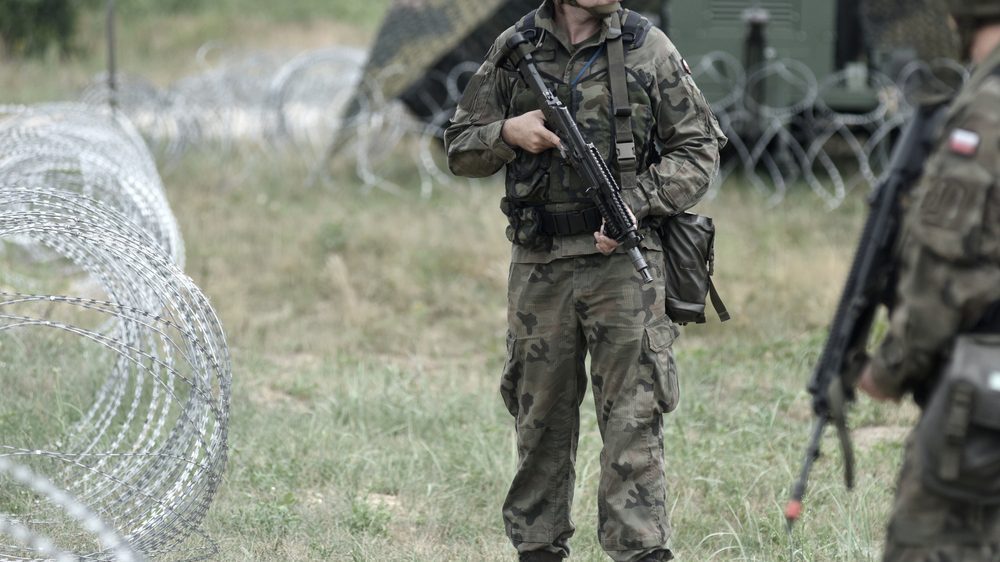Warsaw is sending 500 additional counter-terrorist forces to patrol its fortified border with Belarus as illegal crossing attempts soar, Polish Interior Minister Mariusz Kamiński announced on Twitter on Sunday, July 2nd. The move is also seen as preparation for any possible fallout of Prigozhin’s failed coup attempt in Russia, as Polish authorities worry about Wagner’s increasing military presence in the neighboring country.
“Due to the tense situation on the border with Belarus, I have decided to bolster our forces with 500 Polish police officers from preventive and counter-terrorism units,” Kamiński wrote, adding that the units will join the 5,000 border guards and 2,000 soldiers already stationed there.
W związku z napiętą sytuacją na granicy z 🇧🇾, podjąłem decyzję o wzmocnieniu naszych sił grupą 500 funkcjonariuszy @PolskaPolicja z oddziałów prewencji i kontrterrorystami. Dołączą oni do 5000 funkcjon. @Straz_Graniczna i 2000 żołnierzy pilnujących bezpieczeństwa tej granicy 🇵🇱
— Mariusz Kamiński (@Kaminski_M_) July 2, 2023
Although the interior minister did not elaborate, the “tense situation” clearly refers to the Polish Border Guard’s statement from the day before, revealing that there were 187 illegal crossing attempts just on Saturday and that the migratory pressure on the Belarussian border is steadily increasing.
Although the numbers have not yet reached the 2021 levels—when Belarus began to artificially create a migration crisis by flying African and Middle Eastern migrants into the country and sending them through the border, prompting Warsaw to answer with a 187 km long barbed wire fence and permanent patrols—the Border Guard sees a steady growth in both crossing attempts and violent encounters.
“The [new] groups are more aggressive. There have been many attacks on Polish patrols. Seventeen vehicles have been damaged this year, of which 13 in June alone,” Polish Border Guard spokesman Anna Michalska said.
On Friday, June 30th, Polish Prime Minister Mateusz Morawiecki tweeted a video, comparing the fallout of the riots in France to peaceful scenes in Poland, pledging to keep the borders under control, saying that “security and public order [are] the values from which everything else begins.”
Nasz plan to Europa Bezpiecznych Granic – bezpieczeństwo i porządek publiczny – to są wartości, od których wszystko inne się zaczyna! pic.twitter.com/9anvfDU11d
— Mateusz Morawiecki (@MorawieckiM) June 30, 2023
According to Polish authorities, Warsaw’s decision to increase the security presence at the border is also due to growing fears of Wagner fighters regrouping in Belarus after the mercenary leader Yevgeny Prigozhin’s failed coup attempt last month.
According to the Polish government, Prigozhin was already joined by more than 8,000 of his fighters, which could signal the beginning of “a new phase of hybrid warfare.”
As we previously reported, Poland is not the only European country to worry about the mercenary group’s presence in the country, as leaders wonder whether there are other, less apparent reasons for Wagner’s relocation than just punishment in the form of exile.
“We assume the Wagners aren’t going to Belarus to recuperate, but to carry out a mission. This mission could be aimed at Poland, but also against Lithuania or Ukraine,” Stanisław Żaryn, Poland’s Deputy Minister Coordinator of Special Services told Reuters.
“It is still a matter of analysis and hypotheses whether the Wagner group will engage in destabilizing Poland and will also be active in coordinating the migration route,” he added.





